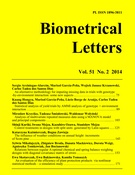
Biometrical Letters Vol. 51(2), 2014, pp. 89-102


|
STATISTICAL ANALYSIS OF YIELD TRIALS BY AMMI ANALYSIS OF GENOTYPE X ENVIRONMENT INTERACTION Kuang Hongyu1,2, Marisol García-Peña1, Lúcio Borges de Araújo3, Carlos Tadeu dos Santos Dias4 1Programa de Pos-graduação em Estatística e Experimentação Agronômica, Universidade de São Paulo, Brazil, e-mail: kuang.usp@gmail.com 2Departamento de Estatística, Universidade Federal de Mato Grosso, Av. Fernando Corrêa da Costa, no 2367 - Bairro Boa Esperança. 78060-900, Cuiabá - MT - Brazil 3Departamento de Estatística, Universidade Federal de Uberlândia, MG, Brazil 4Departamento de Ciências Exatas, Universidade de São Paulo, Brazil |

The genotype by environment interaction (GEI)) has an influence on the selection and recommendation of cultivars. The aim of this work is to study the effect of GEI and evaluate the adaptability and stability of productivity (kg/ha) of nine maize genotypes using AMMI model (Additive Main effects and Multiplicative Interaction). The AMMI model is one of the most widely used statistical tools in the analysis of multiple-environment trials. It has two purposes, namely understanding complex GEI and increasing accuracy. Nevertheless, the AMMI model is a widely used tool for the analysis of multiple-environment trials, where the data are represented by a two-way table of GEI means. In the complete tables, least squares estimation for the AMMI model is equivalent to fitting an additive two-way ANOVA model for the main effects and applying a singular value decomposition to the interaction residuals. It assumes equal weights for all GEI means implicitly. The experiments were conducted in twenty environments, and the experimental design was a randomized complete block design with four repetitions. The AMMI model identified the best combinations of genotypes and environments with respect to the response variable. This paper concerns a basic and a common application of AMMI: yield-trial analysis without consideration of special structure or additional data for either genotypes or environments.

genotype environment interaction (GEI), adaptability and stability, additive main effects and multiplicative interaction model, multienvironment trials
